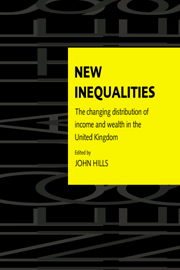Book contents
- Frontmatter
- Contents
- List of figures
- List of tables
- List of contributors
- Acknowledgements
- 1 Introduction: after the turning point
- Part I Income distribution
- Part II Components of income
- Part III Spatial aspects
- Part IV Income and wealth
- 13 Patterns of financial wealth-holding in the United Kingdom
- 14 Home-ownership, housing wealth and wealth distribution in Britain
- Bibliography
- Index
13 - Patterns of financial wealth-holding in the United Kingdom
from Part IV - Income and wealth
Published online by Cambridge University Press: 22 September 2009
- Frontmatter
- Contents
- List of figures
- List of tables
- List of contributors
- Acknowledgements
- 1 Introduction: after the turning point
- Part I Income distribution
- Part II Components of income
- Part III Spatial aspects
- Part IV Income and wealth
- 13 Patterns of financial wealth-holding in the United Kingdom
- 14 Home-ownership, housing wealth and wealth distribution in Britain
- Bibliography
- Index
Summary
Introduction
There are three broad reasons why households might want to accumulate wealth. First, asset stocks are partly a provision for predictable future periods of low income (such as retirement) or high consumption costs (such as those associated with children). Secondly, holding assets can be a precaution against periods of unpredictably low income (such as unemployment) or high consumption costs (such as illness). The third reason is that most forms of saving earn a positive real return which might outweigh the costs of forgoing current consumption for some households. These three motives for saving lead us to expect very different patterns of asset-holding both across and within household types. These differences will be exacerbated by the fact that asset balances are integrally related to past shocks to the households' income or consumption, as well as future plans. In addition, different asset types will play very different roles in household saving plans – high pension saving, for example, is of very little benefit if an individual becomes unemployed. The pattern and level of household saving, which we expect to be highly diverse, will be affected by government policies (particularly tax policies), and will in turn determine the nature of any desirable intervention by government. Yet there is almost no empirical evidence concerning the distribution of wealth at the household or individual level in the United Kingdom, and even less about how portfolios vary by household type and income.
- Type
- Chapter
- Information
- New InequalitiesThe Changing Distribution of Income and Wealth in the United Kingdom, pp. 321 - 347Publisher: Cambridge University PressPrint publication year: 1996
- 1
- Cited by



